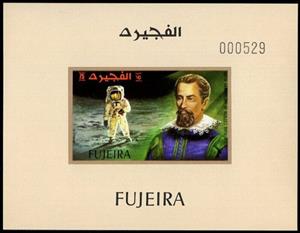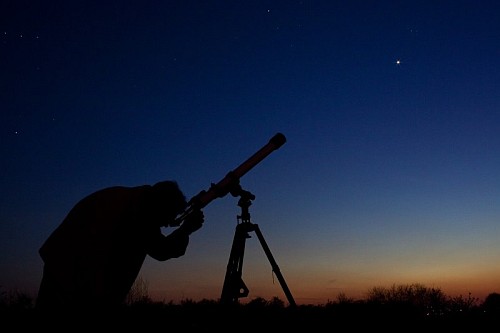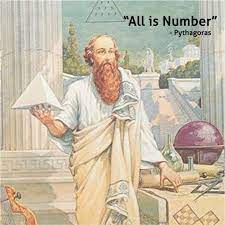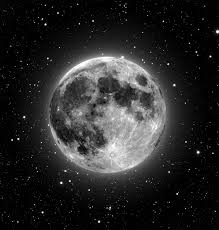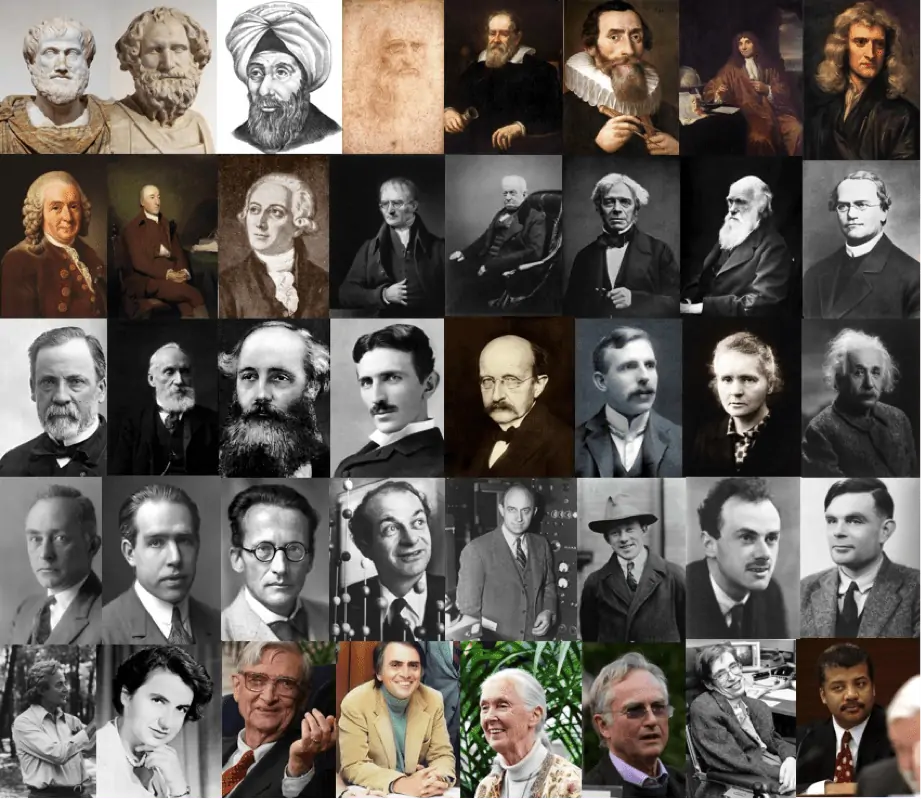Souvenir Sheet: Astronaut on the Moon (Fujairah (Fujeira) 1972)
Astronaut on the Moon (Fujairah (Fujeira) 1972)
31 January (Fujairah (Fujeira) ) within release 400th birthday of Johannes Kepler goes into circulation Souvenir Sheet Astronaut on the Moon face value 75 Qatari dirham
| Souvenir Sheet Astronaut on the Moon in catalogues | |
|---|---|
| Michel: | Mi: FU 827BEBII |
| Colnect codes: | Col: FU 1972.01.31-05e |
Souvenir Sheet is square format.
Coloured frameAlso in the issue 400th birthday of Johannes Kepler:
- Souvenir Sheet - Spacelab face value 5;
- Souvenir Sheet - Spacelab face value 5;
- Full Pane - Astronaut on the Moon face value 20*75;
- Stamp - Astronaut on the Moon face value 75;
- Souvenir Sheet - Astronaut on the Moon face value 75;
- Souvenir Sheet - Astronaut on the Moon face value 75;
- Stamp - Johannes Kepler (1571-1630) face value 35;
- Souvenir Sheet - Johannes Kepler (1571-1630) face value 35;
- Souvenir Sheet - Johannes Kepler (1571-1630) face value 35;
- Full Pane - Mars Probe Voyager face value 20*3;
- Stamp - Mars Probe Voyager face value 3;
- Souvenir Sheet - Mars Probe Voyager face value 3;
- Souvenir Sheet - Mars Probe Voyager face value 3;
- Full Pane - Moon Car face value 20*1;
- Stamp - Moon Car face value 1;
- Souvenir Sheet - Moon Car face value 1;
- Souvenir Sheet - Moon Car face value 1;
- Full Pane - Salyut - Soyuz face value 20*2;
- Stamp - Salyut - Soyuz face value 2;
- Souvenir Sheet - Salyut - Soyuz face value 2;
- Souvenir Sheet - Salyut - Soyuz face value 2;
- Full Pane - Sky Map face value 20*35;
- Full Pane - Spacelab face value 20*5;
- Stamp - Spacelab face value 5;
- Souvenir Sheet - Spacelab face value 5;
- Souvenir Sheet - Spacelab face value 5;
- Stamp - Spacelab face value 5;
- Stamp - Spacelab face value 5;
Souvenir Sheet Astronaut on the Moon it reflects the thematic directions:
An anniversary is the date on which an event took place or an institution was founded in a previous year, and may also refer to the commemoration or celebration of that event. For example, the first event is the initial occurrence or, if planned, the inaugural of the event. One year later would be the first anniversary of that event. The word was first used for Catholic feasts to commemorate saints. Most countries celebrate national anniversaries, typically called national days. These could be the date of independence of the nation or the adoption of a new constitution or form of government. The important dates in a sitting monarch's reign may also be commemorated, an event often referred to as a "Jubilee".
An astronaut (from the Ancient Greek ἄστρον (astron), meaning 'star', and ναύτης (nautes), meaning 'sailor') is a person trained, equipped, and deployed by a human spaceflight program to serve as a commander or crew member aboard a spacecraft. Although generally reserved for professional space travelers, the term is sometimes applied to anyone who travels into space, including scientists, politicians, journalists, and tourists
An astronomer is a scientist in the field of astronomy who focuses their studies on a specific question or field outside the scope of Earth. They observe astronomical objects such as stars, planets, moons, comets and galaxies – in either observational (by analyzing the data) or theoretical astronomy. Examples of topics or fields astronomers study include planetary science, solar astronomy, the origin or evolution of stars, or the formation of galaxies. A related but distinct subject is physical cosmology, which studies the Universe as a whole
One of the earliest known mathematicians was Thales of Miletus (c. 624 – c. 546 BC); he has been hailed as the first true mathematician and the first known individual to whom a mathematical discovery has been attributed.He is credited with the first use of deductive reasoning applied to geometry, by deriving four corollaries to Thales's theorem.
The Moon is Earth's only natural satellite. It orbits at an average distance of 384,400 km (238,900 mi), about 30 times the diameter of Earth. Tidal forces between Earth and the Moon have over time synchronized the Moon's orbital period (lunar month) with its rotation period (lunar day) at 29.5 Earth days, causing the same side of the Moon to always face Earth. The Moon's gravitational pull – and to a lesser extent, the Sun's – are the main drivers of Earth's tides.
Outer space (or simply space) is the expanse that exists beyond Earth's atmosphere and between celestial bodies. It contains ultra-low levels of particle densities, constituting a near-perfect vacuum of predominantly hydrogen and helium plasma, permeated by electromagnetic radiation, cosmic rays, neutrinos, magnetic fields and dust. The baseline temperature of outer space, as set by the background radiation from the Big Bang, is 2.7 kelvins (−270 °C; −455 °F)
A scientist is a person who researches to advance knowledge in an area of the natural sciences
